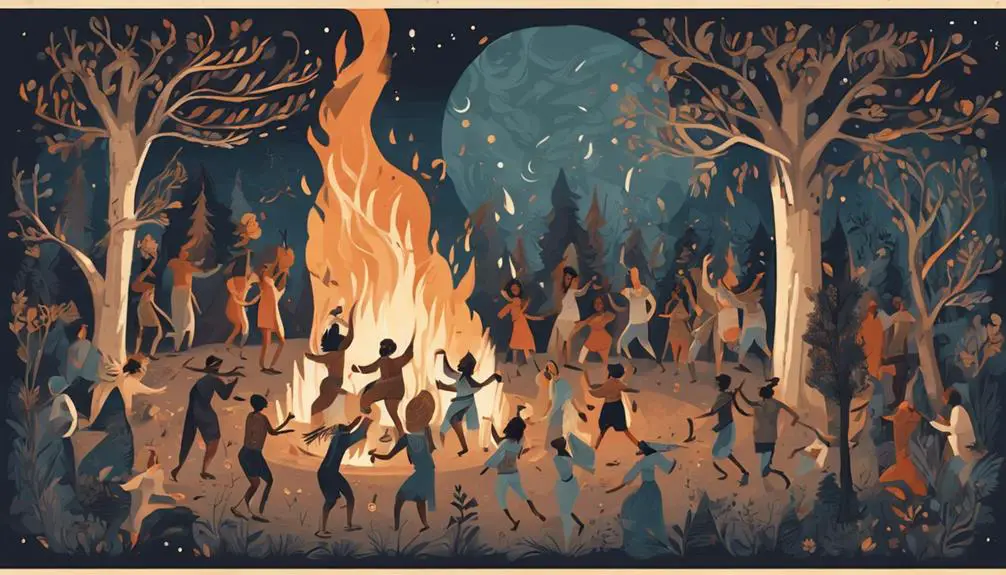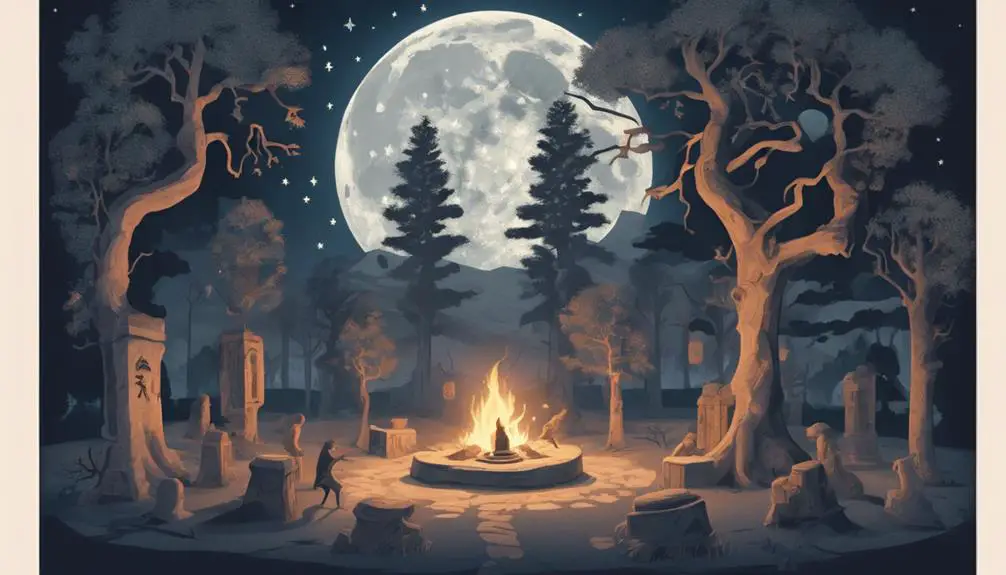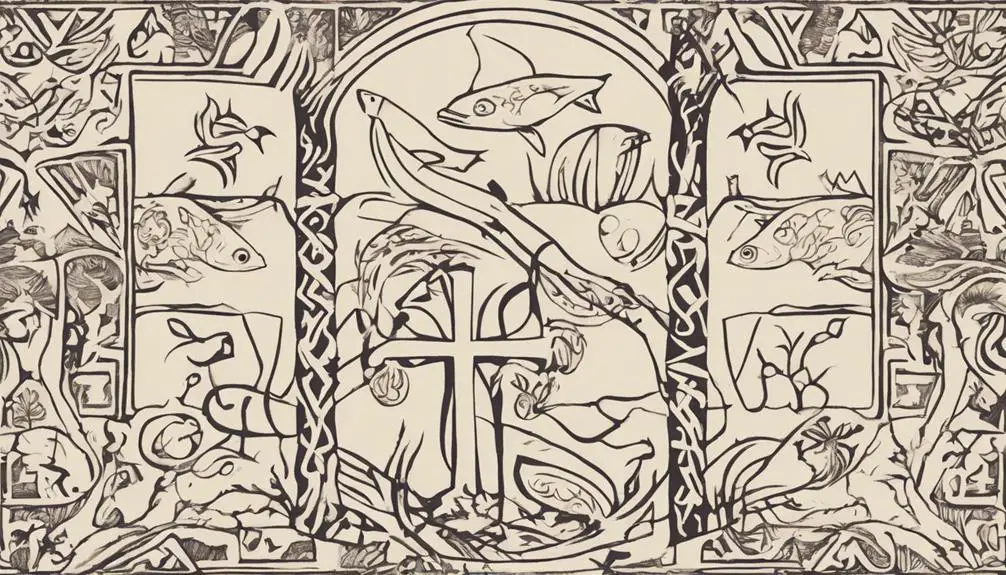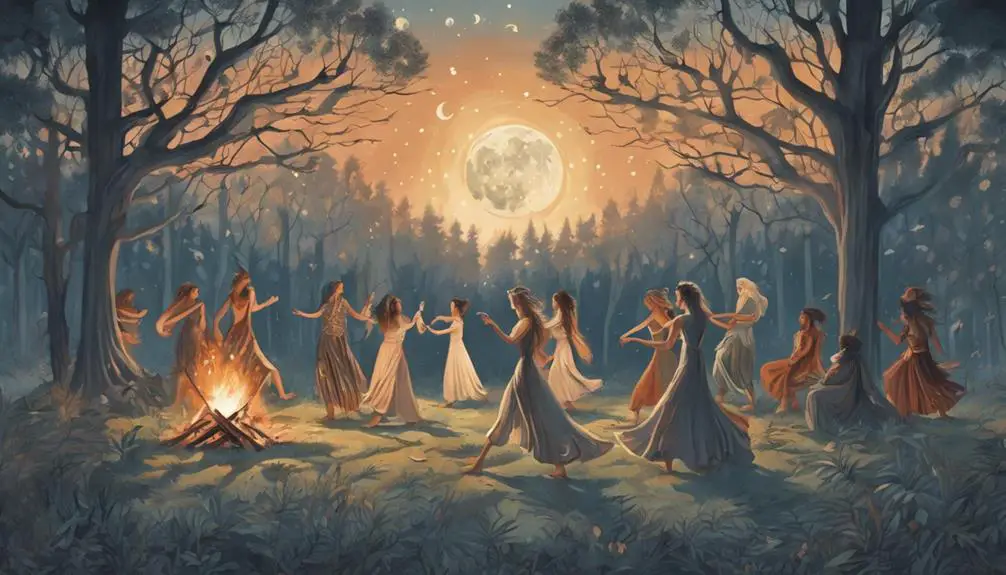Mysteries of pagan revelry in the Bible unveiled: delve into ancient festivities' profound impact on spirituality and ethics, leaving more questions than answers.

What Is Pagan Revelry in the Bible
As you wander through the dense forest of ancient texts, you'll stumble upon the concept of pagan revelry, a thicket of mystery and misunderstanding in the Bible. It's a term that evokes images of wild celebrations, often contrasting sharply with the solemnity typically associated with biblical teachings.
You'll find that this concept isn't merely about parties or festivities; it's imbued with cultural, moral, and ethical layers that have influenced both ancient and modern interpretations. Unraveling its true meaning and implications might just shift your understanding of historical and contemporary spirituality.
Let's embark on this journey together, uncovering the echoes of these ancient celebrations in today's world.
Key Takeaways
- Pagan revelry in the Bible refers to non-Israelite religious festivities, often characterized by feasting, music, and dance.
- Biblical narratives frequently contrast these practices with Israelite worship to highlight issues of faith and loyalty.
- Stories involving pagan revelry serve as cautionary tales, emphasizing the importance of adhering to prescribed religious norms and ethics.
- Modern interpretations of pagan revelry in the Bible often focus on its cultural significance and the lessons it offers about community and spirituality.
Defining Pagan Revelry

Before exploring the instances of pagan revelry in biblical texts, it's crucial to understand what constitutes this form of celebration. Pagan revelry, at its core, refers to the festive practices deeply embedded in the historical origins of various cultures predating or existing outside of monotheistic religions. These celebrations are often marked by an abundance of feasting, music, dancing, and sometimes rituals that honor deities associated with nature, fertility, or seasonal cycles.
To grasp the essence of these celebrations, you've got to look into their historical origins. Many of these festive practices have roots in ancient agricultural societies where the changing seasons and the success of crops were vital to survival and prosperity. Consequently, these communities developed rituals and festivals to appease and honor the gods they believed governed the natural world.
Understanding pagan revelry in this context provides a foundation to appreciate the multifaceted nature of these celebrations. They weren't merely parties; they were deeply symbolic, communal expressions of gratitude, hope, and reverence for the forces perceived to dictate the rhythms of life. This background sets the stage for a more informed exploration of how such practices are reflected or referenced in biblical narratives.
Biblical References Explored
Diving into the biblical texts reveals numerous instances where pagan revelry intersects with the narratives, providing a rich tapestry for analysis and interpretation. When you embark on a scriptural analysis, it's crucial to consider the historical context to fully understand the implications of these events. The Bible often juxtaposes the worship practices of the Israelites with those of surrounding pagan cultures, offering a window into the religious and cultural tensions of the time.
For instance, the golden calf episode in Exodus 32 is a vivid portrayal of pagan revelry clashing with Yahweh worship. This event isn't just a narrative; it's an exploration into the temptation of idolatry among the Israelites, set against their covenant with God. Similarly, in 1 Kings 18, the confrontation between Elijah and the prophets of Baal showcases the stark contrast between the worship of Yahweh and the pagan practices prevalent in the region.
Such scriptural analysis isn't merely academic; it sheds light on the complex interplay between different faith practices and the efforts to maintain religious purity in a polytheistic environment. Through these stories, the Bible communicates messages about faith, loyalty, and the consequences of straying from divine commandments.
Cultural Significance

Analyzing the biblical narratives' depiction of pagan revelry not only illuminates the religious conflicts of the time but also highlights the profound cultural significance these events held within ancient societies. You'll find that these ancient rituals were not merely acts of defiance or hedonistic pursuits but were deeply embedded in the societal fabric, influencing structures, norms, and values.
Aspect |
Description |
Impact |
|---|---|---|
Social Cohesion |
Rituals fostered community unity. |
Strengthened societal bonds. |
Economic Activity |
Festivals stimulated trade and craftsmanship. |
Boosted local economies. |
Political Dimension |
Kings and leaders often sponsored or condemned revelries. |
Shaped power dynamics. |
Religious Expression |
Enabled the practice of traditional beliefs amidst monotheistic pressures. |
Preserved cultural heritage. |
| Identity Formation | Served as a platform for expressing communal identity. | Solidified group belonging.
The societal impact of these rituals cannot be understated. They offered avenues for expressing dissent, commemorating history, and solidifying social hierarchies. Thus, understanding the cultural significance of pagan revelry in biblical times offers invaluable insights into the complexities of ancient societies, their belief systems, and how these have shaped contemporary perspectives on religion, culture, and social cohesion.
Moral and Ethical Implications
Beyond the cultural and social ramifications, it's essential to examine the moral and ethical implications these pagan revelries had within the context of biblical narratives. Through the lens of social responsibility and personal conduct, these stories offer profound lessons on the values and behaviors expected from individuals and societies.
Pagan revelries, as depicted in the Bible, often serve as cautionary tales, highlighting the consequences of deviating from a path of righteousness and the importance of upholding societal norms and ethical standards. They underscore the belief that personal conduct isn't merely a private matter but has far-reaching implications for the welfare and moral fabric of the community.
The narratives encourage you to reflect on the balance between personal freedom and social responsibility. They suggest that while individual expression is valuable, it shouldn't come at the expense of communal harmony and ethical principles. Through these stories, the biblical text advocates for a life led with consideration for others, emphasizing that one's actions should always be aligned with a broader sense of moral and ethical duty.
In this way, the discussion of pagan revelries in the Bible transcends its historical and cultural context, offering timeless insights into how one should navigate the complexities of personal and social ethics.
Modern Interpretations and Legacy

In examining the legacy of pagan revelries as depicted in the Bible, it's crucial to explore how these narratives have been interpreted and reevaluated in modern contexts. Modern scholars and practitioners often view these ancient celebrations through lenses that highlight their relevance to contemporary issues and values, such as ecological perspectives and artistic inspirations.
Aspect |
Traditional View |
Modern Interpretation |
|---|---|---|
Nature |
Seen as backdrop for human activity |
Emphasized for its intrinsic value, leading to ecological perspectives |
Art and Culture |
Marginalized as pagan or heretical |
Celebrated for providing artistic inspirations and insights into human creativity |
Community |
Often portrayed in a negative light |
Revalued as spaces for inclusion and healing, drawing from historical communal aspects of revelries |
These reinterpretations offer a richer, more nuanced understanding of the historical and cultural contexts of biblical narratives. They encourage a dialogue between ancient texts and modern sensibilities, fostering a deeper appreciation for the multifaceted ways in which human societies have celebrated the natural world, expressed themselves artistically, and formed meaningful communities. This approach not only enhances our understanding of the past but also informs our present-day practices and beliefs.
Frequently Asked Questions
What Are the Specific Rituals and Practices That Constituted Pagan Revelry in Ancient Civilizations Outside the Biblical Context?
You're exploring rituals and practices of pagan revelry in ancient civilizations, focusing on ancient festivals and their ritual meanings. These celebrations often included ceremonies to honor deities, seasonal festivities marking changes like solstices, and rites of passage.
They were rich in symbolism, integrating community, nature, and spirituality. Such practices varied widely across cultures, reflecting local beliefs and environments.
Understanding these rituals offers insights into the societal values and spiritual life of ancient peoples.
How Did Early Christian Communities React and Adapt to Surrounding Pagan Revelry Practices During the Spread of Christianity?
As Christianity spread, early Christian communities unexpectedly navigated through a sea of pagan revelry. They didn't simply reject these practices; instead, they showed remarkable Christian tolerance.
Their approach was strategic, aiming to gently reshape pagan customs through conversion strategies rather than direct confrontation. This adaptation didn't dilute their faith but allowed Christianity to grow by integrating into diverse cultures, showcasing an astute understanding of human nature and societal dynamics.
Are There Any Documented Cases of Individuals or Communities Being Punished for Engaging in Pagan Revelry in the Bible, and What Were the Consequences?
Yes, the Bible documents instances where individuals or communities faced divine retribution for engaging in pagan revelry. This is seen as a violation of moral teachings, leading to various consequences.
For example, the Israelites' worship of the Golden Calf led to Moses breaking the tablets of the Ten Commandments in anger and God's punishment of those involved.
Such stories serve to underscore the importance of adhering to the prescribed moral path.
How Do Contemporary Pagan or Neo-Pagan Traditions View and Incorporate the Concept of Revelry in Their Practices Compared to Ancient Times?
Today, you'll find that contemporary pagan or neo-pagan traditions weave modern adaptations into their practices with a nod to ancient festive symbolism.
These groups celebrate revelry not just as mere parties but as profound expressions of connection to nature, deities, and ancestral wisdom.
They've skilfully blended historical rituals with present-day relevance, ensuring their celebrations are both a tribute to their roots and a reflection of current spiritual landscapes.
Can the Concept of Pagan Revelry Be Found in Religious Texts or Traditions Outside the Judeo-Christian Context, and How Is It Portrayed or Interpreted?
Yes, you'll find the concept of pagan revelry in texts and traditions beyond the Judeo-Christian sphere. It's often portrayed in global festivals and through cultural adaptation, showing a rich tapestry of celebration and spirituality.
These portrayals vary widely, reflecting the diversity of global cultures. They offer insights into how different societies view joy, community, and the sacred, often highlighting a deep connection to nature and ancestral traditions.
Conclusion
In conclusion, you've navigated the terrain of pagan revelry within biblical texts, discerning its layers from cultural significance to moral quandaries.
Remember, 'a stitch in time saves nine.' By understanding the past, you're better equipped to navigate the present's complexities.
The fusion of ancient practices and moral teachings offers a rich tapestry for contemporary reflection. Pagan revelry, hence, isn't just a historical footnote—it's a lens through which we can examine enduring human themes, enriching our modern ethical and cultural discourse.



Sign up